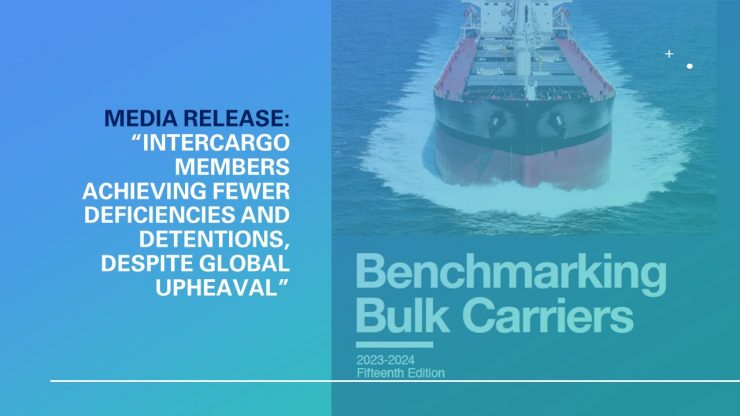Media Release – 27 June 2024
“INTERCARGO members achieving fewer deficiencies
and detentions, despite global upheaval”
INTERCARGO-registered dry bulk ships continue to outperform the industry average in both deficiencies and detentions, as highlighted in the latest INTERCARGO Benchmarking Report on Bulk Carriers.
The report analyses a period marked by geopolitical turmoil due to the Ukrainian crisis and indiscriminate attacks on merchant vessels legally sailing through international waters in Gulf of Aden and Red Sea, leading to injuries and fatalities of innocent seafarers. It also stresses the urgent need for all stakeholders to truly focus on the safety of seafarers and eliminate the occurrence of such threats.
The Benchmarking Bulk Carriers 2023-2024 Report details detention rates and deficiencies per inspection across Flag States, Port State Control, Class, and P&I Clubs, providing owners with benchmarking data and a review of current Negative Performance Indicators across the sector.
INTERCARGO registered vessels consistently demonstrate better performance in Detention Rates (DTR) and Deficiencies per Inspection (DPI) compared to the global dry bulk fleet with the report enabling members to compare their own performance against industry standards.
In 2023, DTR decreased for the dry bulk fleet globally, whilst DPI saw a slight increase across the industry. Statistics from nine regional PSC authorities and two national PSC regimes show that vessels at Australian ports have the highest DPI rate, with AMSA reporting a rate of 3.92% compared to the average of 2.00%. AMSA also has the highest DTR at 4.50%, versus an average of 1.90%. Bulk carriers in the Black Sea, Paris, and Tokyo MoU regions have higher than average detention rates. The Tokyo MoU conducted nearly 15,000 inspections, the highest amongst the regions, followed by Paris and Vina Del Mar MoUs with around 3,800 inspections each.
INTERCARGO is dedicated to operational excellence in safety, security, health, and environmental standards, maintaining a quality policy that exceeds industry norms. In 2023, INTERCARGO achieved record membership, representing one-third of the global dry bulk fleet by deadweight. INTERCARGO continues to promote best practices for the industry as demonstrated by the launch of the DryBMS voluntary self-assessment scheme this spring and its leading role in the formulation of the DryBMS voluntary self-assessment scheme.
INTERCARGO Vice-chairman Spyros Tarasis praised INTERCARGO members for their continued pursuit of operational excellence, he said “the INTERCARGO badge of quality is widely recognized in the industry; I commend members for helping to achieve the Association’s ambitious goals.”
For more information about the report, please visit INTERCARGO’s website at: https://www.intercargo.org/benchmarking-report-2023-2024/
– END –
About INTERCARGO
International shipping is vital for the global economy and prosperity as it transports approximately 90% of world trade. The dry bulk sector is the largest shipping sector in terms of number of ships and deadweight. Dry bulk carriers account for 43% of the world fleet (in tonnage) and carry an estimated 55% of the global transport work. Please view INTERCARGO’s messaging via ESG here: https://www.intercargo.org/esg-review-2024/
The International Association of Dry Cargo Shipowners (INTERCARGO) unites and promotes quality dry bulk shipping, bringing together 250 forward thinking companies from 30 countries. INTERCARGO convened for the first time in 1980 in London and has been participating with consultative status at the International Maritime Organization (IMO) since 1993. INTERCARGO provides the forum where dry bulk shipowners, managers and operators are informed about, discuss, and share concerns on key topics and regulatory challenges, especially in relation to safety, security, the environment, and operational excellence. The Association promotes its members’ positions to IMO, as well as to other shipping and international industry fora, having free and fair competition as a principle.



